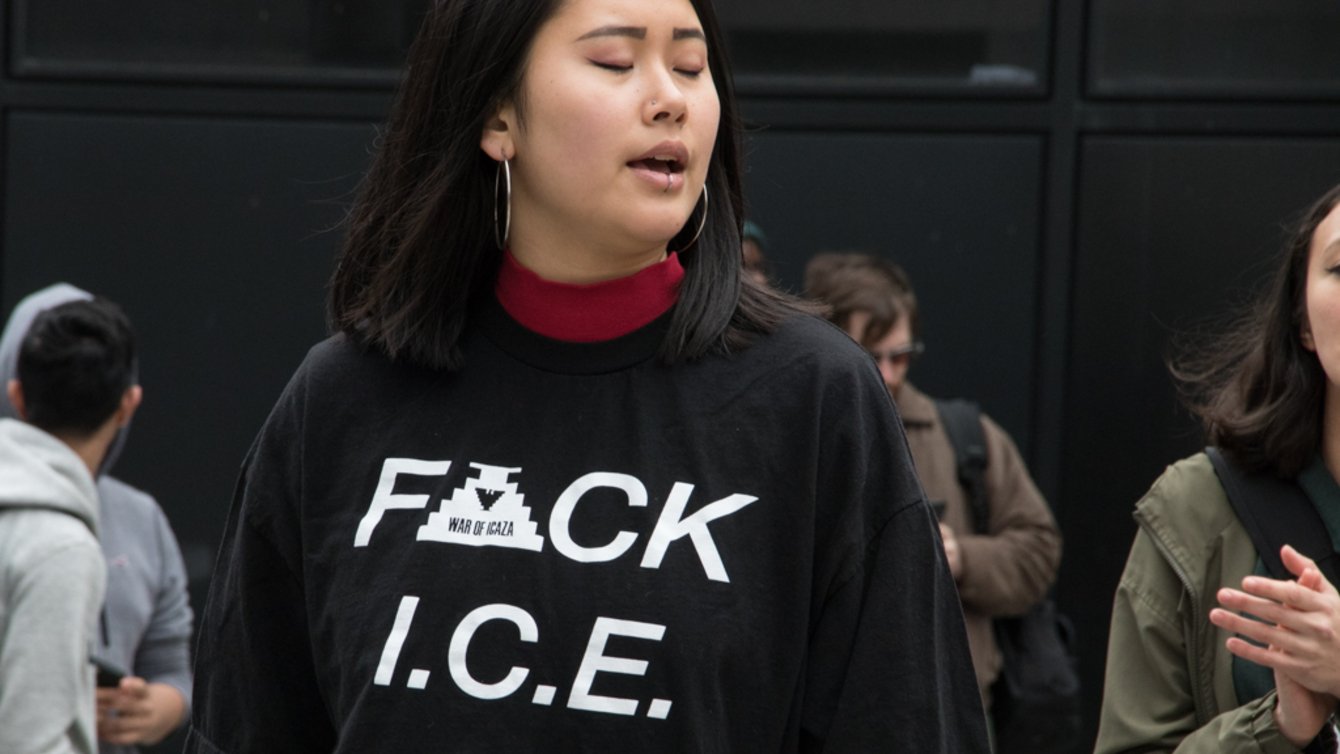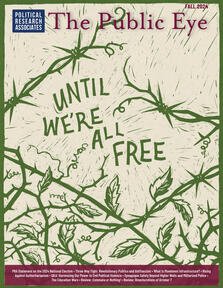Could you tell us who you are and how you started to resist authoritarianism and state Repression occurs when public or private institutions—such as law enforcement agencies or vigilante groups—use arrest, physical coercion, or violence to subjugate a specific group. Learn more ?
My name is Greisa Martínez Rosas. I’m undocumented, unafraid, queer, and unashamed. And I’ve been doing this organizing work for the past 15 years—since I was in high school.
I grew up in Texas, which has historically been a state where it’s difficult to be a woman, a person of color, or an immigrant. When I was 18, my father was detained and later deported. That was the first time that I was confronted with the full weight of what it means to be undocumented in this country.
My dad told me stories of being detained in a room that’s so cold, he signed his own deportation order without counsel or a hearing just to get relief from the desperate conditions. By then, I was involved with United We Dream, and we’d been fighting for the DREAM Act and DACA. That time was the most heart-wrenching and politically defining moment of my life.
What is your sense of the moment we are in? How would you define some of the challenges of the political atmosphere that you’re organizing within right now?
We are in a period of rising authoritarianism, not only here in the U.S., but across the globe. The real harms of living under authoritarianism are why some of our community members have fled to the U.S. A form of far-right populist ultra-nationalism that celebrates the nation or the race as transcending all other loyalties. Learn more and authoritarianism threatened our very lives, so we made the courageous decision to make this our new home.
”Growing anti-immigrant rhetoric signals that we are in an increasingly authoritarian place. That rhetoric—like lies about a ‘Great Replacement’ and the growing impact of that story—has caused the death of many of our people.”
But fascism and authoritarianism have in some ways always existed in America and have thrived in different places across our country, specifically in southern states like Texas, Georgia, and Alabama. That is true in so many ways for Black people in this country, and it’s true for immigrants.
Growing anti-immigrant rhetoric signals that we are in an increasingly authoritarian place. That rhetoric—like lies about a “Great Replacement” and the growing impact of that story—has caused the death of many of our people.
So, fascism is coming and it’s coming on the backs of women, queer people, and immigrants. Over the last 20 years, the budgets of ICE (Immigration and Customs Enforcement) and CBP (Customs and Border Patrol) have tripled in size into billions of dollars.[1] We have seen how women have been forcibly sterilized in detention centers, Black migrants and refugees at the border have been whipped by CBP on horses, and families have been separated.[2]
This moment is the first time in the last 40 years that government negotiations around immigration haven’t included robust protections for undocumented people, and that is telling.
Immigrant communities are uniquely positioned to be on the frontlines of resistance partially because we have experience surviving authoritarian and fascist regimes. We know what it’s like to have our governments not speak for us and not protect us, and still survive. And we have been able to harness the power of young people to imagine a new world.
“There is no labor power or working-class power without immigrants and our stories, vision, and dreams centered in those spaces also.”
That was powerful. And it dovetails perfectly with my next question: How is the infrastructure that you’ve helped build at United We Dream helping people resist this move toward fascism and authoritarianism?
We have made two specific offerings to broader movement infrastructure.
First, since our inception, we have been clear that we don’t live single-issue lives. There has always been clarity that United We Dream is an An umbrella acronym standing for lesbian, gay, bisexual, transgender, and queer or questioning. Learn more and women-led space and that we show up in other movement spaces to make explicit connections between our concerns and struggles.
The issue of immigration is not just about the immigration system. We must name Refers to the particular ways in which structural racism and White supremacy impact Black people. Learn more as a part of why we’re in this mess. Unless we’re clear that Black lives must be centered, queer lives must be centered, the leadership and lives of women must be centered—unless we’re able to do that, there will be no path forward on the issue of immigration.
We have played a critical role in the immigrant rights movement by making this explicit. It’s not only about gaining citizenship, or even about shutting down detention centers and stopping deportations. Those are some ways that we can address harms inflicted on our communities, but it’s not the ultimate goal. A society where we can all thrive interdependently is the goal. Therefore, everything from our strategy to our structures and base-building must reflect that interdependence, even if it makes it hard, slow, or inconvenient for our movement infrastructure.
We’re proud that this has been part of the technology we’ve offered to immigrant rights and other progressive movements. There is no labor power or working-class power without immigrants and our stories, vision, and dreams centered in those spaces also.
“We need more cross-movement spaces that call us home—spaces where young people and elders can be together and make meaning of difficult moments, like the one that we’re in now.”
Second, we harnessed unapologetic storytelling and sharing. It’s not something that emerged purely out of United We Dream. It was a gift from our ancestors in the Student Nonviolent Coordinating Committee (SNCC). They walked with us as we nursed our wounds during difficult moments. And they inspired us to sharpen our ability to share compelling stories that move the needle and create new openings where none existed.
And we have inspired others to use narrative to shift public consciousness. We’ve talked with groups like the Sunrise Movement and the March for Our Lives about how to organize and share their stories. I am proud of how young people continue to hold the arc of speaking and bringing to life a new world.
What do you draw on for inspiration in the struggle to resist heightened The belief in the primacy of “the nation” as the most important political allegiance, that every nation should have its own state, and that it is the primary responsibility of the state and its leaders to preserve the nation. Learn more and authoritarianism?
I feel inspired by young people who are organizing across the globe around immigrant rights. Despite growing repression, they have had some significant wins: organizing in refugee camps; obtaining protection for a segment of undocumented people in Ireland; and in Spain and the U.K., coming together with the experience we had and building infrastructure.
Then there’s the example of the United Farm Workers (UFW), poor people of color from a [predominantly] Latinx framework who demonstrated the power of organized labor from a grassroots power-building perspective. I’m proud that we’re part of their lineage. It’s also a story of evolution. In the UFW’s early years, farm owners drove a wedge between longtime Chicano residents and new immigrants to pit UFW members and undocumented workers against each other. Fast forward to 2018, when Trump was in office: We worked with the farm workers to negotiate a potential immigration bill that had been introduced at that time.
And I’m inspired by the Black Liberation Movement. We need a Black-led, multiracial, working-class movement, and when that is in place, all of us will be able to thrive.
What kind of initiative or movement infrastructure do you hope to see in the coming period?
We need more cross-movement spaces that call us home—spaces where young people and elders can be together and make meaning of difficult moments, like the one that we’re in now. We’re doing ancestral work.
Something that I learned from leaders of the Student Nonviolent Coordinating Committee has stayed with me: the work we do [now] will be necessary, but not sufficient. We need an intergenerational strategy that spans hundreds of years. I think that is the work to be done.
- Endnotes
[1] Refer to “The Cost of Immigration Enforcement and Border Security,” American Immigration Council, August 14, 2024, https://www.americanimmigrationcouncil.org/research/the-cost-of-immigration-enforcement-and-border-security, 5, for the 2024 fiscal year budgets of ICE and CBP, which are close to triple their 2003 budgets (before accounting for inflation); more specifically, U.S. Border Patrol’s 2024 budget is more than 7.5 times its 1994 spending when adjusted for inflation.
[2] “CBP Releases Findings of Investigation into Horse Patrol Activity in Del Rio,” U.S. Customs and Border Protection, July 8, 2022, https://www.cbp.gov/newsroom/national-media-release/cbp-releases-findings-investigation-horse-patrol-activity-del-rio. This claim was investigated and disputed by the U.S. Customs and Border Protection.


